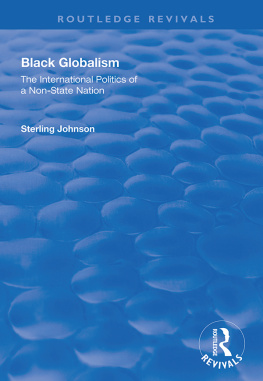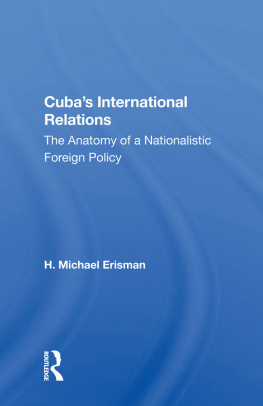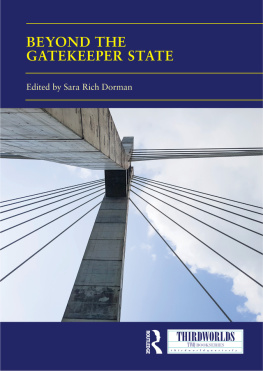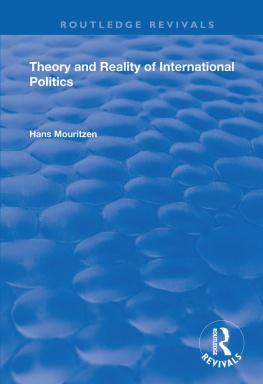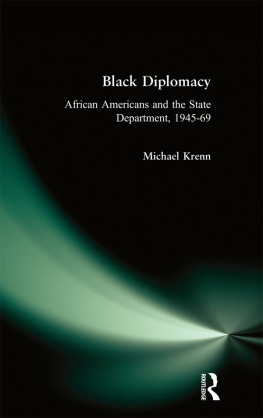BLACK GLOBALISM
To Maya, Julian, Keturah, Emmanuel, Christina, Elijah, Natalie, Candace and Phillip
First published 1998 by Ashgate Publishing
Reissued 2018 by Routledge
2 Park Square, Milton Park, Abingdon, Oxon, 0X14 4RN
711 Third Avenue, New York, NY 10017, USA
Routledge is an imprint of the Taylor & Francis Group, an informa business
Copyright Sterling Johnson 1998
All rights reserved. No part of this book may be reprinted or reproduced or utilised in any form or by any electronic, mechanical, or other means, now known or hereafter invented, including photocopying and recording, or in any information storage or retrieval system, without permission in writing from the publishers.
Notice:
Product or corporate names may be trademarks or registered trademarks, and are used only for identification and explanation without intent to infringe.
Publishers Note
The publisher has gone to great lengths to ensure the quality of this reprint but points out that some imperfections in the original copies may be apparent.
Disclaimer
The publisher has made every effort to trace copyright holders and welcomes correspondence from those they have been unable to contact.
A Library of Congress record exists under LC control number: 97035816
Typeset by Mantn Typesetters, 5-7 Eastfield Road, Louth, Lincolnshire, UK.
ISBN 13: 978-1-138-32053-6 (hbk)
ISBN 13: 978-0-429-44109-7 (ebk)
AAPRP | All Afrikan Peoples Revolutionary Party |
ACS | American Colonization Society |
ACS | African Civilization Society |
AFL | American Federation of Labor |
AHA | American Historical Association |
AIPAC | American Israeli Public Affairs Committee |
ALSC | African Liberation Support Committee |
AMEC | African Methodist Episcopal Church |
ANC | African National Congress |
BISSAL | Blacks in Solidarity with Southern African Liberation |
BPP | Black Panther Party |
BSL | Black Star Line |
CBC | Congressional Black Caucus |
COMINFIL | Communist Infiltration Programme |
COMINTERN | Communist International |
COINTELPRO | Counterintelligence Program |
CORE | Congress of Racial Equality |
FASP | Foreign Affairs Scholars Program |
FEPC | Fair Employment Practices Commission |
FOR | Fellowship of Reconciliation |
FRELIMO | Liberation Front of Mozambique |
FSAEP | Free South Africa Education Program |
FSAM | Free South Africa Movement |
FSO | Foreign Service Officer |
GAO | General Accounting Office |
HUD | Housing and Urban Development |
IASB | Inter-American Service Bureau |
ICAW | International Council of African Women |
ICWU | Industrial Commercial Workers Union |
INR | Bureau of Intelligence and Research |
MFDP | Mississippi Freedom Democratic Party |
MMI | Muslim Mosques International |
MOWM | March On Washington Movement |
NAACP | National Association for Advancement of Colored People |
NAFTA | North American Free Trade Association |
NASA | National Aeronautics and Space Administration |
NCNC | National Council of Nigeria and the Cameroons |
NCOBRA | National Coalition of Blacks for Reparations in America |
NNBL | National Negro Business League |
NNC | National Negro Congress |
NOI | Nation of Islam |
NOW | National Organization of Women |
OAAU | Organization of African-American Unity |
OAU | Organization of African Unity |
PAC | Pan-African Congress |
PLO | Palestinian Liberation Organization |
PCDE | Provisional Committee for the Defence of Ethiopia |
PUSH | People United to Save Humanity |
RAM | Revolutionary Action Movement |
SADCC | Southern African Development Coordinating Conference |
SAMP | Southern Africa Media Program |
SCLC | Southern Christian Leadership Conference |
SDS | Students for a Democratic Society |
TLG | Thursday Luncheon Group |
UNIA | United Negro Improvement Association |
UNITA | National Union for the Total Independence of Angola |
USIA | United States Information Agency |
WILLPF | Womens International League for Peace and Freedom |
YATS | Youth Attitude Tracking Survey |
For more than 400 years Africans in the United States have fought to realize the principles embedded in the Declaration of Independence and framed in the US Constitution. Many psychosocial issues facing the African-American community, such as the fratricide, the destruction of the family and teenage pregnancy originated aboard the first slave ship, Jesus, which landed in Jamestown Virginia in 1619. The vision of a return to Africa, politically, spiritually and economically originate in that same year. Historically, the nature and intensity of the African-American relationship to Africa has been a barometer of the level of racism and sense of alienation felt among black people in American society and politics. This international and foreign policy activity by African-Americans has taken on many cultural, economic, political patterns and themes often linked to the domestic racial environment.
It has long been recognized that national political systems, like all organized human groups, exist in, are conditioned by and respond to a larger environment. International political systems are shaped by, and are responsive to, developments that occur within the units of which they are comprised. It is only within the past few decades that these national and international linkages have been subjected to systematic, sustained and comparative inquiry (Rosenau, 1969). Race has always been a factor in both American politics and in African-American political weakness. Only in rare instances, such as the case of Italys invasion of Ethiopia, has the foreign policy decision-making elite taken into account the wishes of the nations largest ethno-racial minority. Yet African-Americans have regarded the United States as their country for far longer than most minority whites (such as the Irish, Italians, Poles and Germans) and furthermore, black religious and intellectual leaders have long taken an interest in US foreign policy as an important function of their Americanism (Deconde, 1992). However, for much of history, the US government and the US Constitution have excluded citizens of African origin from the inalienable rights guaranteed to these other groups. This has meant, that for much of US history, African-Americans have had to engage in transnational relations - that is, contacts, coalitions, and interactions across state boundaries that are not controlled by the central foreign policy organs of governments (Keohane and Nye, 1970). The concept of non-state nation is also applicable to the Native-American (Indian) nations, the Palestinians, the Basques of France and Spain and the Kurds of Iran, Iraq and Turkey.

